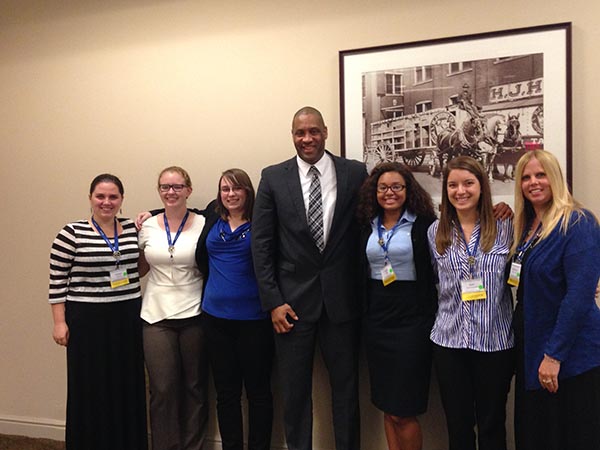Associate Professor of Sociology Michele Lee Kozimor-King said students gain practical experience and make valuable connections at professional conferences. So she brings them along when she can. In October, Amira Allen ’15, Samantha Poremba ’16 and Kaitlyn Xanthopoulos ’15 joined their faculty mentor and alumna Barbara Prince ’12 at the Association for Applied and Clinical Sociology’s annual meeting in Pittsburgh, and they returned from Steel City with connections, accolades and awards.
This was Kozimor-King’s first time attending this particular conference, and she’s certain Elizabethtown made an impression. Allen, Poremba and Xanthopoulos won the Student Project Competition for a presentation about their community-based research work with LancasterHistory.org—they came out on top, above graduate and doctoral students, said Kozimor-King.
“They got amazing feedback; the judges were amazed at the work they did at an undergraduate level,” she said. But the students weren’t at lunch to hear the announcement. They were hard at work gathering material for another contest.
Perhaps the highlight of the conference was the Judith Little Problem-Solving Competition, an interactive research-based contest that was designed to be integrated into the conference. Kozimor-King and Prince, who is a Ph.D. candidate at Bowling Green State University, advised the trio of students as they thought of a solution for a real problem, for a real client. Pittsburgh-based The Veteran’s Place was the community partner for the project, and one of its leaders gave a presentation to contest participants. After hearing the rules and participating in a Q&A session, students were turned loose. Kozimor-King said students were expected to attend sessions, interview scholars and complete a well-researched presentation and executive summary in less than two days.
They got amazing feedback; the judges were amazed at the work they did at an undergraduate level.”
 Kozimor-King said the biggest challenge for The Veterans’ Place is identifying potential clients; there’s a double stigma—“homelessness and being a homeless veteran,” she said. Many don’t self-identify, which makes reaching its audience difficult. Taking a cue from William Strickland’s book about the Pittsburgh-based Manchester Bidwell Training Center model they talked about in class, Kozimor-King explained that the students agreed with the notion that an institution should “look like the solution, not like the problem.” They thought The Veteran’s Place looked like it could use some TLC. Maybe even a partnership with the school, since it, too, serves adults in transition. Their idea, Kozimor-King said, was to beautify the physical center, enlisting the help of those it serves so, one, the veterans can take ownership and, two, learn a skill. They shared these ideas through a multimedia presentation, without notecards and brought some audience members to tears.
Kozimor-King said the biggest challenge for The Veterans’ Place is identifying potential clients; there’s a double stigma—“homelessness and being a homeless veteran,” she said. Many don’t self-identify, which makes reaching its audience difficult. Taking a cue from William Strickland’s book about the Pittsburgh-based Manchester Bidwell Training Center model they talked about in class, Kozimor-King explained that the students agreed with the notion that an institution should “look like the solution, not like the problem.” They thought The Veteran’s Place looked like it could use some TLC. Maybe even a partnership with the school, since it, too, serves adults in transition. Their idea, Kozimor-King said, was to beautify the physical center, enlisting the help of those it serves so, one, the veterans can take ownership and, two, learn a skill. They shared these ideas through a multimedia presentation, without notecards and brought some audience members to tears.
“They are the most skilled presenters I’ve seen,” she said, adding that the students interviewed veterans, attended sessions and practiced until the wee hours of the morning. In fact, she added, students put on final touches just moments before they were required to be in the room.
The professor said that judges told the Elizabethtown students that they had the most professional presentation; however, they did not win. She speculates that the judges didn’t think the idea would have the most immediate impact. While the team wasn’t victorious in the Little Competition, their concept was a success: The organization is putting a beautification project into its strategic plan. Kozimor-King said she would love to for the students to continue a relationship with The Veteran’s Place and also that she’s interested in building a Judith Little-style competition at Elizabethtown.
“It was one of the most rigorous projects I’ve ever seen,” she said.
During the conference, Kozimor-King also cofacilitated a workshop on using community-based research to teach research methods and statistical analysis with Poremba and alumna Prince,—the result of student-faculty research during last year’s Summer Creative Arts and Research Program, for which Prince also provided mentorship.
The AACS conference was not the only one Elizabethtown sociology students attended this year; at the Pennsylvania Sociological Society Undergraduate Student Research Poster Competition in October, a group of five — Amira Allen, Samantha Poremba, Emilee Rhubright, Mallory Slusser and Kayla Stickell — presented research posters. Rhubright took first place, Allen placed second and Poremba finished third. The work they all did for and at these conferences, said Kozimor-King, connect to two of the College’s five Signature Learning Experiences: community-based learning and faculty-mentored research.
GROUP PHOTO: From left to right: Barbara Prince (alumna), Samantha Poremba, Jaqui Stilson (Veterans Place), Marlon Ferguson (Veterans Place), Amira Allen, Kaitlyn Xanthopoulos, Michele Lee Kozimor-King.


